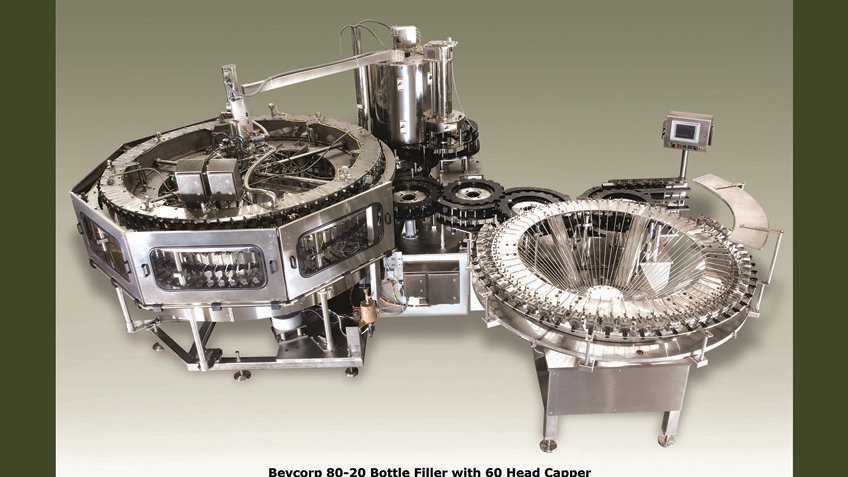Recommended For You
Challenge
- Finding distribution methods that extend beyond typical keg and inline bottling systems while keeping in mind consumer preference for unique and regionally distinct beverages
Solutions
Results
- At run speed, the fillers maintain production efficiency of 85 percent or better and retain fill height consistency at ± 3 millimeters
- Bevcorp filler can generally be up and running in 45 minutes or less – even in “hard changeover” situations
The entrepreneurial spirit is alive and well in the North American beverage community.
During the past decade, the number of microbreweries and niche soft drink producers has increased exponentially in response to consumer preference for unique and regionally distinct beverages. And there's no end in sight.
To grow their businesses, craft beverage producers must eventually look for distribution methods that extend beyond typical keg and inline bottling systems.
Bevcorp, a leading supplier to the world's largest beverage companies, provides cost-eff ective solutions to meet this need.
Based in Willoughby, Ohio, Bevcorp is a full service provider of can and bottle fillers, blenders, crowners, cappers, seamers, rinsers, MicroBlend™ blending systems, container handling and refrigeration equipment, and deaeration systems.
“After achieving success in a local market, many smaller producers look to expand distribution,” said John Beeze, director of FCI containers, Bevcorp. “Our rebuild/exchange program makes high-volume rotary filling equipment aff ordable for craft producers – and the contract packagers who serve them.”
Bevcorp boasts an extensive portfolio of rotary filling equipment ranging from standard mechanical gravity fillers to complex electronic volumetric systems.
The company's line of stainless steel mechanical bottle fillers with cappers, built with refurbished equipment, is a cost-effective solution for producers seeking to boost production.
Typically, small- to medium-size beverage producers and co-packers bottle product with inline equipment based on intermittent motion systems, which can reach speeds up to 200 bottles per minute (bpm).
Rotary bottling machines operate in a continuous-motion environment and can achieve speeds of 800 bpm or more.
In rotary systems, carbonated product is fed to a filler bowl from the processing side of the application.
The filler bowl holds the beverage under pressure to retain carbonation. A rotary valve assembly extending from the bowl fills bottles entering the system on conveyor.
To meet diverse needs and production speeds, Bevcorp provides options that include anywhere from 28 to 104 valves.
Bottles are capped via an integrated rotary capper. “No matter what the size, our machines are designed for accuracy and efficiency,” said Beeze.
At run speed, the fillers maintain production efficiency of 85 percent or better and retain fill height consistency at ± 3 millimeters.
“For all beverage producers, changeover speed is also critical,” said Beeze. “Our machines feature recipe-driven changeover from the operator interface and quick-change mechanical adjustments.”
In addition, the system incorporates Clean-in-Place (CIP) functionality to enable automatic sanitation of the filler bowl, valves and related equipment between production runs.
As a result, the Bevcorp filler can generally be up and running in 45 minutes or less – even in “hard changeover” situations that involve transitions between vastly different products and bottles.
“To provide affordable systems, we actively buy-back our equipment then customize and refurbish it to OEM specifications to meet customer requirements,” said Jim O'Keeffe, marketing manager, Bevcorp. “The Rockwell Automation product offering provides us with the flexibility to retrofit our machines with up-to-date technology very cost-effectively.”
For control, the refurbished machines feature an Allen-Bradley® Compact GuardLogix® safety system designed to meet Category 3 – and ANSI/PMMI B155.1 – requirements.
For servo motion requirements, the system utilizes Allen-Bradley Kinetix® 6500 Ethernet/IP™servo drives. The machine runs on an EtherNet/IP network and is typically monitored on Allen-Bradley PanelView™ Plus 6 1000 graphic terminals.
“Generally, we provide centralized control with Allen-Bradley POINT I/O™ running on EtherNet/IP and monitored locally,” explained Eric Hendrickson, engineering manager, Bevcorp.
“However, we have also integrated our equipment into a plant's overall supervisory system using FactoryTalk® View SE software upon request.”
Bevcorp also leverages the Rockwell Automation control system to provide remote monitoring and equipment modification for their customers as required.
Looking toward the future, Bevcorp continues to focus on research and development initiatives aimed at improving already impressive changeover times and production throughput for bottlers of all sizes.
“Our company has used Rockwell Automation controls for more than 20 years,” said Hendrickson. “We look forward to continuing our relationship and optimizing our equipment. Whenever we have application challenges, we know we can count on Rockwell Automation for support.”
For more information, contact: General Sales, Bevcorp, LLC Phone: 440.954.3500 Email: sales@bevcorp.com
Published October 1, 2014

